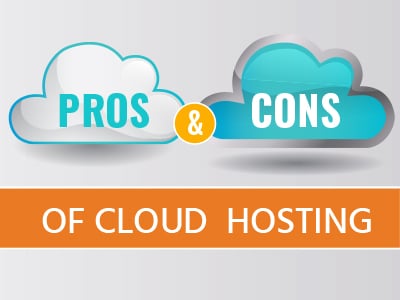It seems like everyone is talking about “the Cloud” and what it can do for your business. Many companies prefer the flexibility and cost-effectiveness of cloud hosting. However, like any business tool, there are times when it makes sense to adopt new technology, and there are times when it just isn’t the right fit for your current requirements. To make an informed decision, it’s best to learn the benefits and disadvantages of choosing cloud hosting. Let’s dive in.
In-house Servers Vs Cloud
You can always stick with traditional in-house servers for your IT systems and storage. It gives you ultimate control over your backups, security, critical data, and data privacy. It can also be more cost-effective for smaller organizations.
However, that requires a significant investment in infrastructure and hardware. You’ll not only need physical room to store your servers, but you’ll have to invest in IT staff to properly maintain those servers, and if your servers are damaged, you could lose vital data.

That’s why you might want to consider cloud hosting. Of course, cloud solutions have their pros and cons as well.
The Benefits and Disadvantages of Choosing Cloud Hosting
Benefits of Cloud Hosting:
- Easy Access Anywhere, Anytime
The surge in remote working has caused a strain on IT. Employees need to easily access company systems and data outside the office, and that could be anytime from anywhere. Cloud hosting allows any employee with an internet connection to access company resources and web-based applications, such as Office 365. This ensures continued efficiency and productivity, as well as easy collaboration, even if users are in several locations.
- Flexibility to Scale Technology
When it comes to cloud servers, you only pay for what you need. If your company’s needs fluctuate, then cloud computing allows for that. Services can easily be scaled up or down on a monthly basis. If your business expands, you’ll be able to accommodate the increased need for technological resources quickly and easily because the system grows with you.
- Better Backup and Data Restoration
Downtime is a business-killer and if something goes wrong, you need to recover your data fast and restore your backups as soon as possible. Cloud services offer quicker data retrieval and a quicker recovery. Also, with cloud hosting, backups are automatic, usually in 15-minute intervals, creating redundancy that makes data loss less likely. Backups can also be easily initiated from any device.
- Increased Uptime
Cloud hosting uses interconnected servers that create a natural redundancy. If one goes down, systems and applications can be shifted to another server, allowing for uptime rates close to 99.9%. Better yet, if you have a company like Com Pro fully managing your cloud infrastructure, we guarantee reliable monitoring of your systems, to detect any performance issues, so we can resolve them quickly and keep your IT running smoothly.
Disadvantages of Cloud Hosting:
- Greater Cybersecurity Risk
Because cloud hosting is web-based there is always increased vulnerability and risk of data breaches. Companies who store most of their data in the cloud should be concerned with cybersecurity. You need to select a reputable cloud hosting provider, whose security measures are extensive. You might want to ask questions, such as, am I sharing my cloud hosting with other companies and how many? Is our data kept separate from others? Will I be accessing a service that requires companies to share resources?
- Lack of Control Over the Cloud
Cloud services are run on remote servers that are owned and operated by your cloud provider. This can pose a control issue because you are essentially handing over your company’s data and entrusting its care to the cloud vendor you select. Even in-house IT staff will have little control over how cloud services are managed. What softens that lack of control is a provider’s accessibility. With Com Pro, we have a 24/7 local support desk that monitors for any problems and we are always accessible to in-house staff if they have questions.
- Servers Are Still Needed
Using the cloud doesn’t mean you can do away with all your IT infrastructure. Yes, you can contract out most of your Managed IT to a trusted provider. However, many cloud servers are not backed up, so it’s a good idea to build in some redundancy by backing up your own data in a few local storage devices. What cloud hosting allows you to do is to minimize the number of servers you need to maintain, which makes life much easier for your in-house IT staff.
- Cloud Services May Have Limitations
Some companies only provide the most popular cloud services and may not offer enough customization. You can also end up locked into a specific provider because it isn’t always simple to migrate your data to another cloud platform. It could result in downtime, incompatibilities with your existing applications, configuration problems or support issues. Migrations can also leave your data vulnerable. That’s why you should investigate your cloud provider, to see if they guarantee a smooth migration, security, and to know exactly what services you’re getting.
To Cloud or Not to Cloud?
As you can see, the benefits and disadvantages of choosing cloud hosting can make the decision a tricky one. Ask yourself:
- Is it worth the spend? Will it benefit my business in the long term?
- Will I really use all the cloud services? It needs to be a useful investment.
- Do I need the flexibility to scale my IT? Am I in a process of rapid change and growth?
- Am I comfortable giving up some control of my IT management?
The next step is choosing the right provider. At Com Pro, we build trusted relationships with our customers by being completely up front about our services, guarantees and pricing. We won’t promise what we can’t deliver.
Want to learn more about Com Pro Cloud Solutions and how we can offer you the latest high-performing infrastructure for a reasonable monthly price? Contact Us!

